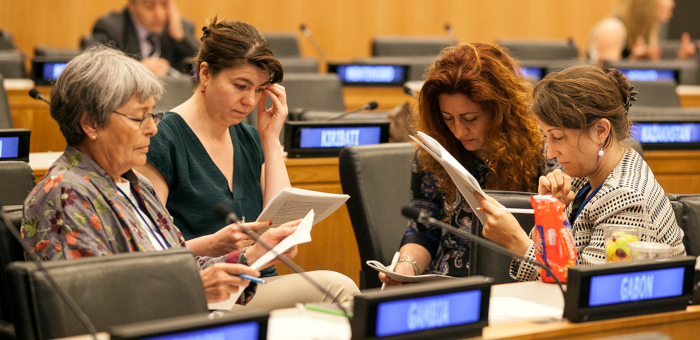19th Meeting of the UN Open-ended Informal
Consultative Process on Oceans and the Law of the Sea
Anthropogenic Underwater Noise
18-22 June 2018 | UN Headquarters, New York

Delegates reading the Co-Chairs’ summary at the |
||
|
The nineteenth meeting of the UN Open-ended Informal Consultative Process (ICP) on Oceans and the Law of the Sea will take place from 18-22 June 2018 at the UN Headquarters in New York. The UN General Assembly established the ICP to facilitate annual review of developments in ocean affairs and the law of the sea with an emphasis on identifying areas where coordination and cooperation at the intergovernmental and inter-agency levels should be enhanced. In 2017, ICP-18 focused on “The effects of climate change on oceans.” Please see our ICP-18 summary and analysis. ICP-19 will focus on “Anthropogenic underwater noise.” For many marine animals, sound is the preferred sensory medium. Underwater noise has increased with expansion of industrial activities in the marine environment, affecting many types of marine biota. Most relevant international rules, standards and recommended practices are non-legally binding, largely sectoral, and focused on specific activities or affected species. Regional and national efforts tend toward guidelines and codes of conduct. Significant data and knowledge gaps hinder development of effective management measures to protect marine species. The “informal” nature of the ICP allows delegates to dive more deeply into a specific topic area each year, with presentations from subject-matter expects followed by discussions. Key expectations for ICP-19 include exchanging information about:
On the potential for enhanced coordination and cooperation to address anthropogenic underwater noise, discussion topics will likely include:
The Co-Chair’s summary document is expected to highlight issues of most concern for delegates and identify potential areas for future coordination and cooperation. |
||
|
IISD Reporting Services, through its Earth Negotiations Bulletin (ENB) Meeting Coverage, provided daily digital coverage from the 19th Meeting of the UN Open-ended Informal Consultative Process on Oceans and the Law of the Sea. In addition IISD Reporting Services has published a summary and analysis report from the meeting, which is available in HTML and PDF. Photos by IISD/ENB | Diego Noguera | ||
|
IISD Reporting Services is grateful to the many donors of the Earth Negotiations Bulletin (ENB) and recognizes the following as core contributors to the ENB: the European Union and the Kingdom of Saudi Arabia. General Support for the Bulletin during 2018 is provided by the German Federal Ministry for the Environment, Nature Conservation and Nuclear Safety (BMU), Italian Ministry for the Environment, Land and Sea, Japanese Ministry of Environment (through the Institute for Global Environmental Strategies - IGES), New Zealand Ministry of Foreign Affairs and Trade, Swedish Ministry of Foreign Affairs, Government of Switzerland (Swiss Federal Office for the Environment (FOEN), and SWAN International. Funding for translation of the Bulletin into French has been provided by the Government of France, Wallonia, Québec, and the Institute of La Francophonie for Sustainable Development (IFDD), a subsidiary body of the International Organization of La Francophonie (OIF). |
||

